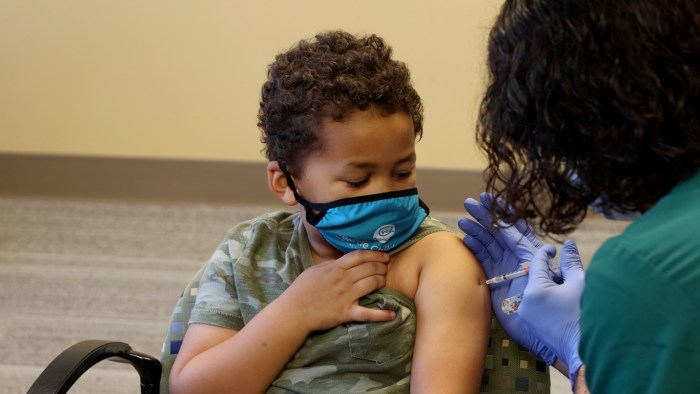
Since the start of the COVID-19 pandemic, people have been asking ethical questions about vaccinating children against the disease: Is it necessary to vaccinate children, who seem to experience the disease differently than adults? Should children in school be required to get the vaccine?
We spoke to Dr. Doug Diekema, an emergency medicine physician at Seattle Children’s and director of education in the Treuman Katz Center for Pediatric Bioethics, to discuss these and other questions about vaccinating kids against COVID-19. Read on to learn more.
How would you advise parents who are not sure if they should vaccinate their child against COVID-19?
Most of us in the medical field believe the best thing for kids right now is to get a COVID-19 vaccine. We’re dealing with a disease that, although considerably less serious in most children than in adults, has had a negative impact on a lot of children, not just in terms of death and severe illness, but also long-term side effects.
Despite that, about 50% of parents in the United States don’t plan to vaccinate their kids right away.
How does delaying or refusing to vaccinate a child for COVID-19 compare to opting out of other vaccines?
There are similarities and differences. Families have worried about vaccine safety, vaccine ingredients and vaccine necessity since as far back as the smallpox vaccine over 200 years ago.
While some families have these same concerns about the COVID-19 vaccines, others are refusing vaccination because they distrust the government or scientific and medical experts or because nearly everything about the COVID-19 pandemic has become politicized.
For the first time in history, people are deciding whether to receive a vaccine based on their political beliefs. It’s become an ideological issue rather than a reasoned assessment of safety and effectiveness. That’s led to a much greater number of people who hesitate or refuse to get the vaccine.
All of this has been intensified by social media — a powerful tool that has spread misleading information since the start of the pandemic.
Should schools require students to receive the vaccine?
I think it would be wrong to require COVID-19 vaccination for school attendance at this point, even if the goal is to vaccinate as much of the population as possible. Taking kids who are not vaccinated out of school has a negative impact on their lives, and to justify that should require a high level of certainty that COVID-19 vaccines are safe and effective in both preventing disease and preventing spread among children in school.
While mandating the vaccine in schools will likely be justifiable at some point, I don’t think it is today. The vaccine is still being administered to children under an emergency use authorization, which does not require the same level of evidence for safety and efficacy as full authorization from the Food and Drug Administration. Even with full FDA approval, we may not have long-term, follow-up data to evaluate rare side effects for years.
Knowing about half of U.S. parents are concerned about giving their child the vaccine, I believe a mandate at this point would do more harm than good, undermining confidence and trust among a population that is already hesitant.
(Dr. Diekema recently published a paper on this subject with Dr. Doug Opel, director of Clinical Ethics and vice-chair of the Ethics Committee at Children’s, and University of Chicago Bioethicist Dr. Lainie Friedman Ross.)

